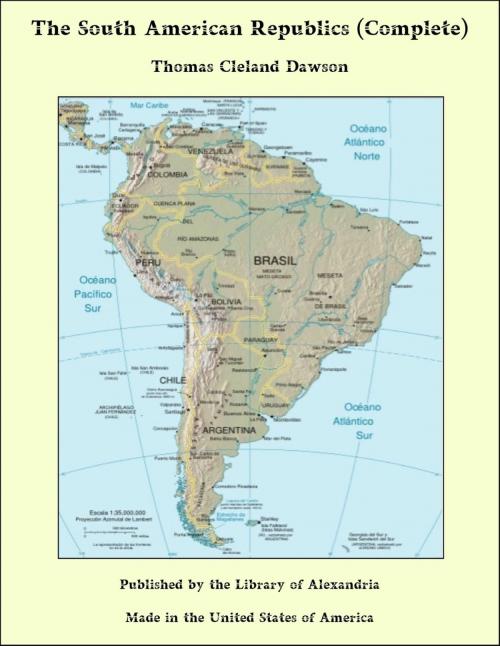The South American Republics (Complete)
Nonfiction, Religion & Spirituality, New Age, History, Fiction & Literature| Author: | Thomas Cleland Dawson | ISBN: | 9781465508966 |
| Publisher: | Library of Alexandria | Publication: | March 8, 2015 |
| Imprint: | Language: | English |
| Author: | Thomas Cleland Dawson |
| ISBN: | 9781465508966 |
| Publisher: | Library of Alexandria |
| Publication: | March 8, 2015 |
| Imprint: | |
| Language: | English |
The question most frequently asked me since I began my stay in South America has been: "Why do they have so many revolutions there?" Possibly the events recounted in the following pages may help the reader to answer this for himself. I hope that he will share my conviction that militarism has already definitely disappeared from more than half the continent and is slowly becoming less powerful in the remainder. Constitutional traditions, inherited from Spain and Portugal, implanted a tendency toward disintegration; Spanish and Portuguese tyranny bred in the people a distrust of all rulers and governments; the war of independence brought to the front military adventurers; civil disorders were inevitable, and the search for forms of government that should be final and stable has been very painful. On the other hand, the generous impulse that prompted the movement toward independence has grown into an earnest desire for ordered liberty, which is steadily spreading among all classes. Civic capacity is increasing among the body of South Americans and immigration is raising the industrial level. They are slowly evolving among themselves the best form of government for their special needs and conditions, and a citizen of the United States must rejoice to see that that form is and will surely remain republican. It is hard to secure from the tangle of events called South American history a clearly defined picture. At the risk of repetition I have tried to tell separately the story of each country, because each has its special history and its peculiar characteristics. All of these states have, however, had much in common and it is only in the case of the larger nations that social and political conditions have been described in detail. A study of either Argentina, Brazil, Chile, or Venezuela is likely to throw most light on the political development of the continent, while Peru, Bolivia, and Colombia are more interesting to the seeker for local colour and the lover of the dramatic.
The question most frequently asked me since I began my stay in South America has been: "Why do they have so many revolutions there?" Possibly the events recounted in the following pages may help the reader to answer this for himself. I hope that he will share my conviction that militarism has already definitely disappeared from more than half the continent and is slowly becoming less powerful in the remainder. Constitutional traditions, inherited from Spain and Portugal, implanted a tendency toward disintegration; Spanish and Portuguese tyranny bred in the people a distrust of all rulers and governments; the war of independence brought to the front military adventurers; civil disorders were inevitable, and the search for forms of government that should be final and stable has been very painful. On the other hand, the generous impulse that prompted the movement toward independence has grown into an earnest desire for ordered liberty, which is steadily spreading among all classes. Civic capacity is increasing among the body of South Americans and immigration is raising the industrial level. They are slowly evolving among themselves the best form of government for their special needs and conditions, and a citizen of the United States must rejoice to see that that form is and will surely remain republican. It is hard to secure from the tangle of events called South American history a clearly defined picture. At the risk of repetition I have tried to tell separately the story of each country, because each has its special history and its peculiar characteristics. All of these states have, however, had much in common and it is only in the case of the larger nations that social and political conditions have been described in detail. A study of either Argentina, Brazil, Chile, or Venezuela is likely to throw most light on the political development of the continent, while Peru, Bolivia, and Colombia are more interesting to the seeker for local colour and the lover of the dramatic.















